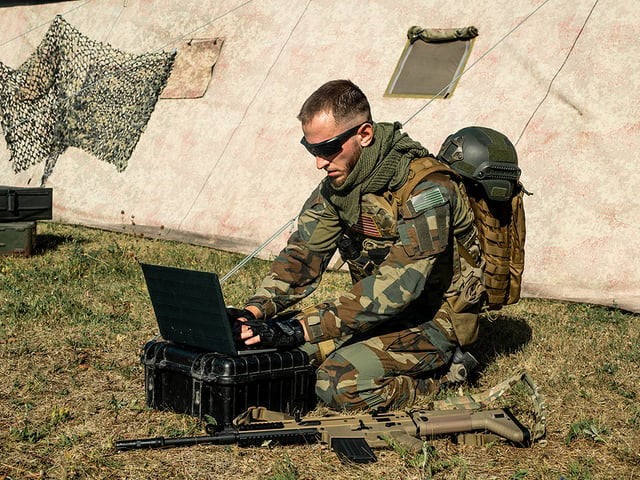
ASVAB Word Knowledge Test: What You Need to Know to Do Well
The Word Knowledge section of the Armed Services Vocational Aptitude Battery (ASVAB) measures your vocabulary knowledge and verbal skills. Understanding the test format, studying strategically, and becoming familiar with common prefixes, suffixes, and root words can significantly improve your score. This article will walk you through the necessary steps to achieve a high score in this section.
What is the ASVAB Word Knowledge Test?
The ASVAB Word Knowledge Test is an assessment that forms part of the Armed Services Vocational Aptitude Battery (ASVAB). It is designed to evaluate an individual’s knowledge and understanding of word meanings. The Word Knowledge Test is just one of the ten subtests that make up the ASVAB, which is used by the United States military to determine eligibility and placement in various military occupations.
On the CAT-ASVAB, test-takers are presented with 15 questions that must be answered within a time limit of 9 minutes, and those taking the paper and pencil version will have 11 minutes to answer 35 questions. The questions are formatted in a multiple-choice style, providing four options for each question. The primary objective of this test is to assess the test-taker’s ability to comprehend and interpret the meanings of different words.
The questions on the Word Knowledge Test can generally be classified into two types: synonym questions and sentence completion questions. Synonym questions require the test-taker to identify a word that is most similar or equivalent in meaning to the given word. They are presented with a word and then must select the synonym from the provided options. These questions aim to measure the test-taker’s understanding of word relationships and their ability to discern similarities in meaning.
Sentence completion questions, on the other hand, involve presenting the test-taker with a sentence that has a word missing. The individual must choose the most appropriate word from the options provided to complete the sentence logically and meaningfully. These questions assess the test-taker’s grasp of contextual usage and their ability to select the most fitting word to ensure sentence coherence.
By evaluating an individual’s word knowledge and comprehension, the Word Knowledge Test provides insights into their verbal abilities, including vocabulary breadth and understanding of word meanings. This information can be valuable for military recruitment purposes, helping to identify candidates with strong verbal skills who may excel in certain occupational specialties.
How to Study for the ASVAB Word Knowledge Test
Understanding Word Roots, Prefixes, and Suffixes
Word roots, prefixes, and suffixes are essential for expanding your vocabulary. Instead of memorizing a vast number of words, learning these building blocks allows you to understand a wider variety of words, even those you’ve never encountered before.
Root Words: A root is the most basic form of a word from which other words grow, usually through the addition of prefixes and suffixes. For instance, the root ‘spect’ means to look, and it’s found in words like inspect, respect, and spectacles.
Prefixes: These are added to the beginning of a root word to change its meaning. For example, the prefix ‘un-‘ denotes the opposite or negative, transforming “happy” into “unhappy”.
Suffixes: These are attached to the end of root words, also altering their meaning. For instance, the suffix ‘-ness’ turns adjectives into nouns, like “happy” to “happiness”.
By mastering root words, prefixes, and suffixes, you can break down complex words and understand their basic meanings. Make flashcards with common roots, prefixes, and suffixes, and practice daily. Below are some common prefixes, suffixes, and root words that will be beneficial to understand.
Common Prefixes
-
un- (not): unhappy, undo
-
re- (again): redo, rewrite
-
dis- (opposite of, not): disagree, disconnect
-
in-, im-, il-, ir- (not): impossible, illegal
-
pre- (before): predict, prehistoric
-
mis- (wrong): misunderstand, misinterpret
-
over- (excessive, above): overreact, overlook
-
under- (below, insufficient): underestimate, underpay
-
multi- (many, much): multicolored, multiply
-
non- (not, without): nonfiction, nonviolent
Common Suffixes
-
-ness (state of): happiness, darkness
-
-ly (in the manner of): quickly, silently
-
-able, -ible (capable of): edible, payable
-
-less (without): hopeless, tasteless
-
-ful (full of): helpful, peaceful
-
-ment (result, action): improvement, development
-
-able, -ible (capable of): understandable, visible
-
-er, -or (person or thing that does): teacher, actor
-
-ship (state or quality): friendship, leadership
-
-ize, -ise (to make, to become): legalize, harmonize
Common Root Words
-
spect (to look): inspect, spectator
-
graph (to write): autograph, biography
-
port (to carry): transport, import
-
dict (to say): predict, contradict
-
tract (to pull): tractor, extract
-
bio (life): biology, biography
-
chrono (time): chronology, chronological
-
aud (to hear): audio, audition
-
struct (to build): structure, construction
-
tele (far off, distant): telephone, television
Regular Reading
Regular reading helps you naturally expand your vocabulary and understand word usage. Try to diversify your reading materials, including newspapers, novels, and academic articles. Make sure to note down any unfamiliar words you encounter, look up their meanings, and try to use them in your own sentences to reinforce understanding.
“Speak” Aloud and Make an Educated Guess
If context clues and word parts aren’t getting you anywhere, try looking at the word and saying it out loud to yourself (quietly!). What word(s) does it remind you of visually? What word(s) does it sound like? Sometimes, there are visual or audio clues that will remind you of another word with a similar meaning, and then you can make an educated guess. When all else fails, it’s important to do this. That’s because the ASVAB does not penalize test-takers for not answering a question or for getting a question wrong. So, if you can make an educated guess about a word, you may get it right and boost your score. But remember, this is a timed test, so whichever strategies you employ, apply them quickly and move on to the next question.
Practice Tests
Take full advantage of ASVAB practice tests and quizzes to get a feel for the actual test environment. These will give you an understanding of your strengths and weaknesses and help you gauge the pace needed to complete the test within the time limit. In addition, practicing with ASVAB practice tests can improve your test-taking skills and build your confidence. By repeatedly exposing yourself to the types of questions and challenges you’ll encounter on the ASVAB, you’ll become more comfortable with the test format and develop effective strategies for approaching different question styles. This familiarity can help reduce anxiety and increase your overall performance on the actual exam.
Get Ready to Ace the ASVAB Word Knowledge Section!
Remember, the key to success in the ASVAB Word Knowledge Test is consistent study, practice, and a sound understanding of word construction. By implementing these tips and learning strategies, you’ll be well on your way to acing the test!
Keep Reading

Armed Services Vocational Aptitude Battery Blog
What is the ASVAB Test?
The Armed Services Vocational Aptitude Battery, known as the ASVAB, is …

Armed Services Vocational Aptitude Battery Blog
Military MOS Codes
Military Occupational Specialty (MOS) codes are an integral part of the…

Armed Services Vocational Aptitude Battery Blog
U.S. Army Height and Weight Standards for Females
The U.S. Army’s commitment to maintaining a robust, physically fit, and…